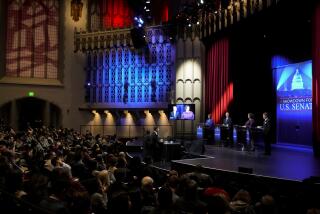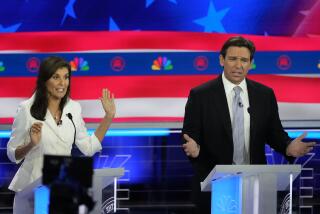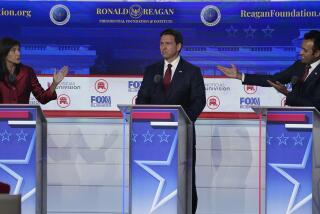Critic’s Choice: Must-see debate week TV: ‘The Choice 2016,’ ‘Debate Wars’ and ‘Drunk History’
Debate night! When presidential candidates stand side by side to test the strength of their arguments and the effectiveness of their rhetoric! (Sure.)
An audience of a bazillion gazillion is expected, because more than usually the shape of the world, from pole to pole and meridian to meridian, will be determined by this election, so utterly different are the Democratic and Republican nominees. Still, notwithstanding the constant assertion from every corner of the press that this could be the night that decides the election — and with an electorate willing to vote on the basis of a (prepackaged) killer zinger or unexpected, even unrepresentative gaffe, I suppose it could — you will learn only how the candidates behave in a debate against each other. Their policies have already been proclaimed and posted elsewhere, their characters made clear, and anyone who claims to be on the fence this year is either practicing a perverse willfulness or has been paying no attention at all. Or what, I just can’t imagine.
There will be some novelty tonight in seeing the opponents finally occupying the same frame, it’s true, and some benefit in seeing who rattles whom, since a rattled commander in chief is no good to anyone. There will be burble spoken afterward about who “looked presidential.” But it will tell you nothing significant about how how a candidate might fare dealing with a foreign strongman or a stroppy Congress. In any case, both sides will declare victory, and some percentage of the punditry will agree.
“Presidential Debate”: 9 p.m. Eastern (6 p.m. PT), Monday. KCBS; KNBC; KTLA; KABC; KTTV; KCAL; KOCE; KPBS; Bloomberg; CNBC; CNN; CSPAN; CSPAN2; Fox Business; Fox News; MSNBC
Tuesday brings the PBS “Frontline” documentary “The Choice: 2016,” an election-year tradition since 1988, which also stands the candidates side by side for the electorate to compare and contrast. The approach here is psychobiographical, an attempt to comprehend the contestants in respect to the forces that shaped them, the nurture (or lack of it) that created the nature that defines their aims and works, and in that sense it is sympathetic to both. Both, we hear, are “fighters who have spent decades in the public eye,” “symbols of a bitterly divided country” whose “life stories … have led them to this moment” — which is pretty much where the resemblance ends. More interesting is the portrait of how differently two people, born a little more than a year apart, have represented their generation, navigated their times and defined success — the influence of Methodism and Martin Luther King on Clinton and that of Norman Vincent Peale and Hugh Hefner on Trump.

As in the debates, policy is less the point than personality: Clinton’s sometimes self-defeating need for secrecy, Trump’s bottomless need for attention, and so on. Accordingly, it’s the reporting on their earlier years that’s most interesting, rather than yet another rehearsal of their more recent, more familiar adventures and misadventures. I don’t know how many votes “The Choice” might change, but you may come away with a little better understanding of the person you don’t support, for what that’s worth.
They are partial portraits, of course, but the program does make clear that one of these candidates has a lifelong interest in public service and politics and the other does not. (Clip from “The Celebrity Apprentice.” Trump: “A lot of people are saying I should run for president. … Meat Loaf, should I run for president?” Meat Loaf: “Absolutely.”) It’s suggested by the filmmakers that his running for president was spurred by his being publicly mocked by Barack Obama at the 2011 White House Correspondents Dinner. It makes as much sense as anything.
“The Choice: 2016”: 9 p.m. PT, Tuesday. PBS SoCal
Nature versus nurture is also one of the subjects tackled in “Debate Wars,” a recently premiered series from Seeso, NBCUniversal’s streaming comedy channel. “Popeye,” says Connor Ratliff by way of example. “He didn’t always like spinach. He had to be nurtured into liking spinach by his father, Poopdeck Pappy, played in the classic Robert Altman film by Mr. Ray Walston. Strong to the finish. Not because his nature, because of his nurture.”
Under the watchful, arbitrary eye of host Michael Ian Black, teams of comics argue the superiority of cake versus pie, dogs versus cats, vacation versus staycation, Internet versus IRL, in remarks both prepared and extempore.
“The gift of speech is what separates man from beast,” says Black. “Wield it well, you shall be rewarded with riches and praise; wield it poorly and you … not … do … so ... good.”
As debates go, it’s closer to the forensic ideal than what you may see from the stage at Hofstra tonight, even though the syllogisms might go comically awry, where materials that would ordinarily build a house produce a giraffe. Comedy, even in a one-liner, is argument, not mere assertion; it’s funny only when you can see the sense the nonsense upends — it’s expecting a house that makes the giraffe hilarious.
“Debate Wars”: now streaming on Seeso
This week also sees the return of Derek Waters’ “Drunk History,” in which notable events of the American past are related by a well-informed but also inebriated person, whose recorded words become the narration and dialogue (mimed and acted by costumed actors) of an elaborate re-creation. A fourth season of this singular series, which makes history oddly more vivid and present when seen through a veil of alcohol, would have seemed too much to hope for back when it transitioned from Web series to cable TV.
But here it is again, with an opening episode built around the theme of “Great Escapes,” featuring Thomas Lennon as Timothy Leary; the ubiquitous Chris Parnell as Charles Joughin, the baker who survived the Titanic; and Thomas Middleditch as William Willis, an American sailor who helped a man break out of Devil’s Island. (Also dressing up this season are Jason Ritter, Natasha Leggero, Giancarlo Esposito, Parker Posey, Maya Rudolph, Tony Hale, Will Ferrell, Nathan Fillion, Octavia Spencer, Martin Starr, Jaleel White, Jack McBrayer, Stephen Merchant, Chelsea Peretti, Alia Shawkat and Zach Woods, among many other studded stars. Inebriated narrators include Paget Brewster, Bob Odenkirk, Lauren Lapkus, Jenny Slate, and the year’s big score, Lin-Manuel Miranda, narrating tales from the life of Alexander Hamilton.)
The Comedy Central series runs on tension — the interplay between the drunk and the sober, the historical event and the contemporary vernacular, and the fact that every character is played simultaneously by two people. (It occurs to me as I write this that the show is, among other things, a kind of backstage comedy.) But it is also a celebration: In getting hammered, the storytellers’ respect and enthusiasm for their assigned or chosen subjects only increases, until they are no longer able to form words to express it.
“Drunk History”: 10:30 p.m. Tuesdays. Comedy Central
On Twitter @LATimesTVLloyd
Also:
Derek Waters’ ‘Drunk History’ looks at the past through a glass, drunkly
Yes, Ted Cruz, CNBC’s Republican debate was a cage match
More to Read
The complete guide to home viewing
Get Screen Gab for everything about the TV shows and streaming movies everyone’s talking about.
You may occasionally receive promotional content from the Los Angeles Times.







